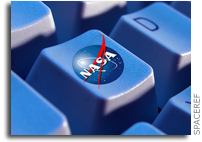NASA Hacked Again
 NASA, ESA confirm hacks; The Unknowns says systems patched, ZDNet
NASA, ESA confirm hacks; The Unknowns says systems patched, ZDNet
“For the NASA hack, the group also decided to leak one of the research center’s databases. They released names, employers, home addresses, and e-mail addresses of 736 victims on Pastebin. ESA is the other organization for which they also leaked more data, also via Pastebin. Both NASA and ESA have now confirmed the attacks. NASA security officials detected an intrusion into the site on April 20 and took it offline,” a NASA spokesperson said in a statement. “The agency takes the issue of IT security very seriously and at no point was sensitive or controlled information compromised. NASA has made significant progress to better protect the agency’s IT systems and is in the process of mitigating any remaining vulnerabilities that could allow intrusions in the future.”









NASA cannot possibly have been hacked because they make us use passwords of 700 characters with twelve different punctuations and then change them every two hours. NASA IT experts assure us that hacking occurs only because hackers can discover our passwords by guessing all the combinations if we don’t memorize new passwords every day.
Strange that my bank does not require this nonsense to protect millions of accounts.
Network security is hard. I bet if there were passwords or credit card data in any of that they swiped, they were encrypted and likely safe.
This is one proof that even one of the world’s most technologically sound entities is not absolutely secure. When it comes to data management, being overprotective is not enough. We need to make sure that we employ the most reliable means to protect confidential information especially now that almost everything is easily exchanged electronically.
Ruby Badcoe